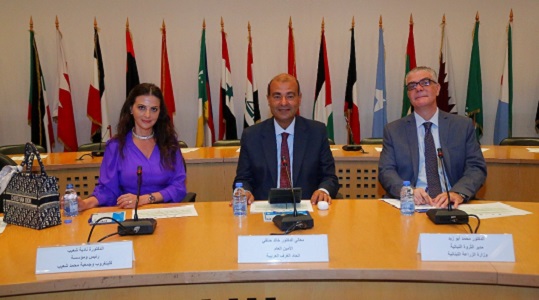The Secretary-General of the Union of Arab Chambers, Dr. Khaled Hanafi, confirmed during the conference on healthy food and herbal medicine to achieve sustainable development goals, at the headquarters of the Union of Arab Chambers in Beirut, on 7/2/2024, that the holding of this important event, in light of the circumstances that Lebanon and the Arab region are experiencing as a result of the ongoing war on Gaza since October 7, 2023, resulting from the keenness of the Union of Arab Chambers and the organizing partners to overcome the afflictions and difficulties, and to emphasize that Beirut will remain the pearl of Arab capitals and the destination of those who come to it, even in light of concerns and delicate circumstances.
The event was organized by the Union of Arab Chambers, the Kleingroup Foundation, and the Muhammad Shuaib Social Association, represented by its president, Dr. Nadia Shuaib, under the auspices of the Ministry of Agriculture in Lebanon, in the presence of the representative of His Excellency the Minister of Agriculture, Abbas Al-Haj Hassan, the Director of Plant Wealth in the Ministry, Dr. Muhammad Abu Zeid, in addition to experts, academics and specialists from Lebanon, Arab and foreign countries.
The Secretary-General of the Federation explained that “preserving health is a goal shared by the world’s population in the past and even today, as humans have discovered the therapeutic properties of herbs since the dawn of civilization. Starting from Egypt, Mesopotamia, China, and India, passing through the Greeks and Romans, all the way to the era of Islam, where the contribution of Muslim scholars in various fields of science and medicine extended from the eighth century to the sixteenth century.”
He revealed, “Unhealthy nutrition causes about 11 million deaths worldwide annually. This number of deaths represents one-fifth of the world's deaths annually. Millions of people already die every year as a result of hunger, including 6 million children under the age of five. Meanwhile, the ongoing war in Gaza has led to nearly 3,000 children losing access to treatment for moderate and severe malnutrition, putting them at risk of death as horrific acts of violence and displacement continue to disrupt families’ access to healthcare facilities and services. This number, based on reports from UNICEF nutrition partners, is approximately three-quarters of the 3,800 children estimated to have been receiving life-saving care in the south before the escalation of the conflict in Rafah.”
He continued: “A recent report issued by the United Nations showed that the sustainable development goals that were set to be achieved around the world by 2030 are still far from being achieved. The report indicated that the 17 goals, including addressing poverty and hunger, and work to achieve them began in 2015, are still far from the right track to ensure their achievement, for many reasons, including lack of funding, geopolitical tensions, and the Corona pandemic. The UN report concluded that none of the 17 agreed-upon goals is on track to be achieved by 2030 and that most of the goals have witnessed limited progress or decline over the past years.”
The Secretary-General of the Union, Dr. Khaled Hanafi, pointed out, “In the face of this reality, the important question is: Where do Arab governments start? The answer to this question lies in investing in data, as data collection and dissemination are among the fundamental areas in which governments in the region must invest. In addition to providing this data openly to the public, this data “leaks” from the institutions concerned with collecting statistics in countries to the official bodies concerned with indicators of sustainable development goals in each country. It is also necessary to exploit data in research and development, as governments must cooperate with universities and local research institutions to improve the level and quantity of current data and adopt other methods for measuring sustainable development that are closely related to contexts at the level of countries and regions, whereas sustainable development varies greatly from one region to another.”
Dr. Khaled Hanafi called for “the necessity of establishing procedures that allow the integration of experts and institutions that produce knowledge related to sustainable development, and their involvement in policy-making and planning at the state level. This is done by funding research and development projects that focus on finding solutions and promoting the creation of knowledge networks that generate practical knowledge for implementing the Sustainable Development Goals. Investing in introducing sustainable development by building competencies and raising awareness across government sectors regarding sustainable development goals, and working with scientists and communicators to make science and policy accessible to the public. Incorporating sustainable development goals into school and university curricula. As well as supporting sponsors of achieving sustainable development goals in the private sector and encouraging companies to integrate sustainable development into their operations and business strategies.”
Source (Union of Arab Chambers)

